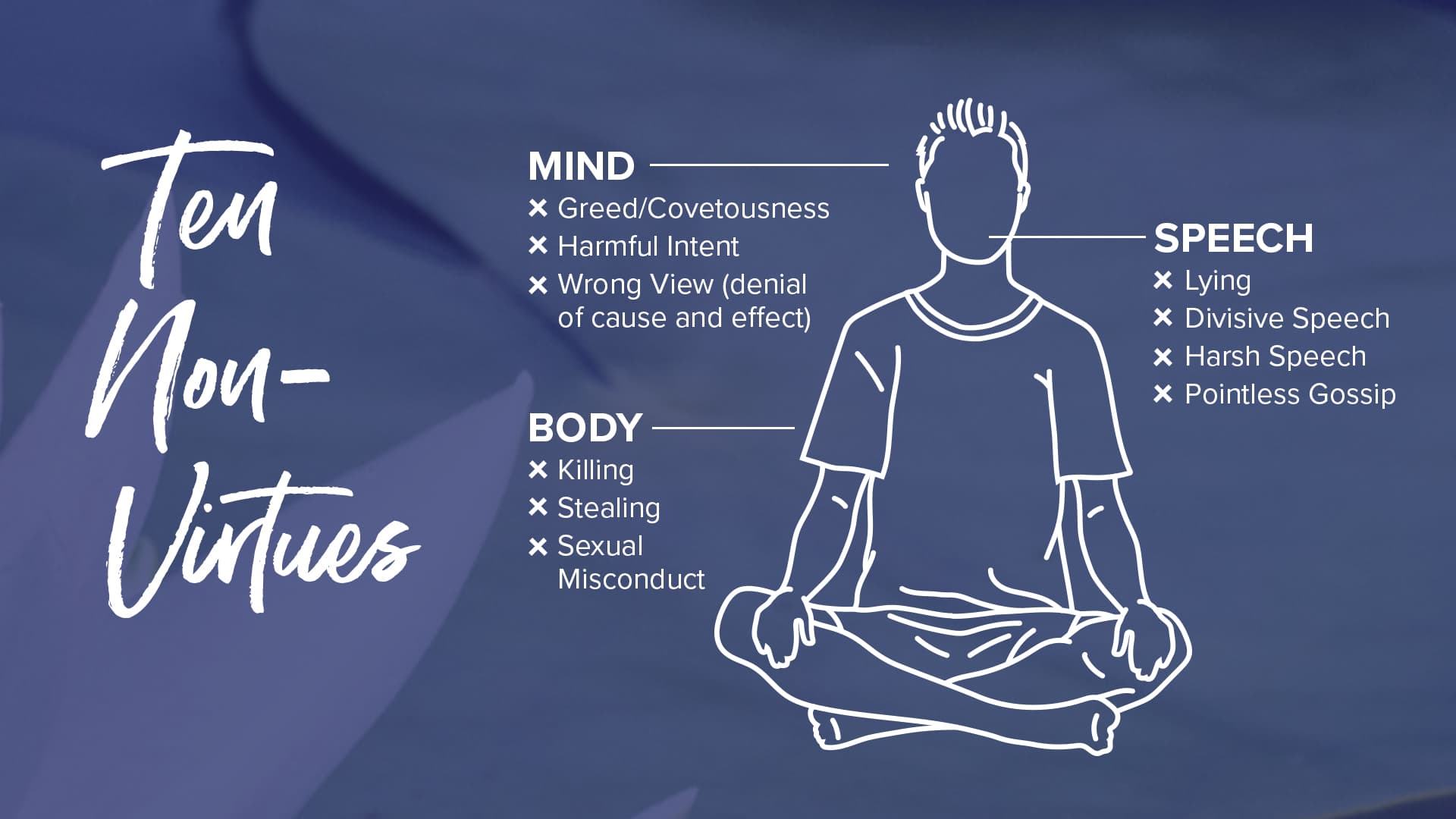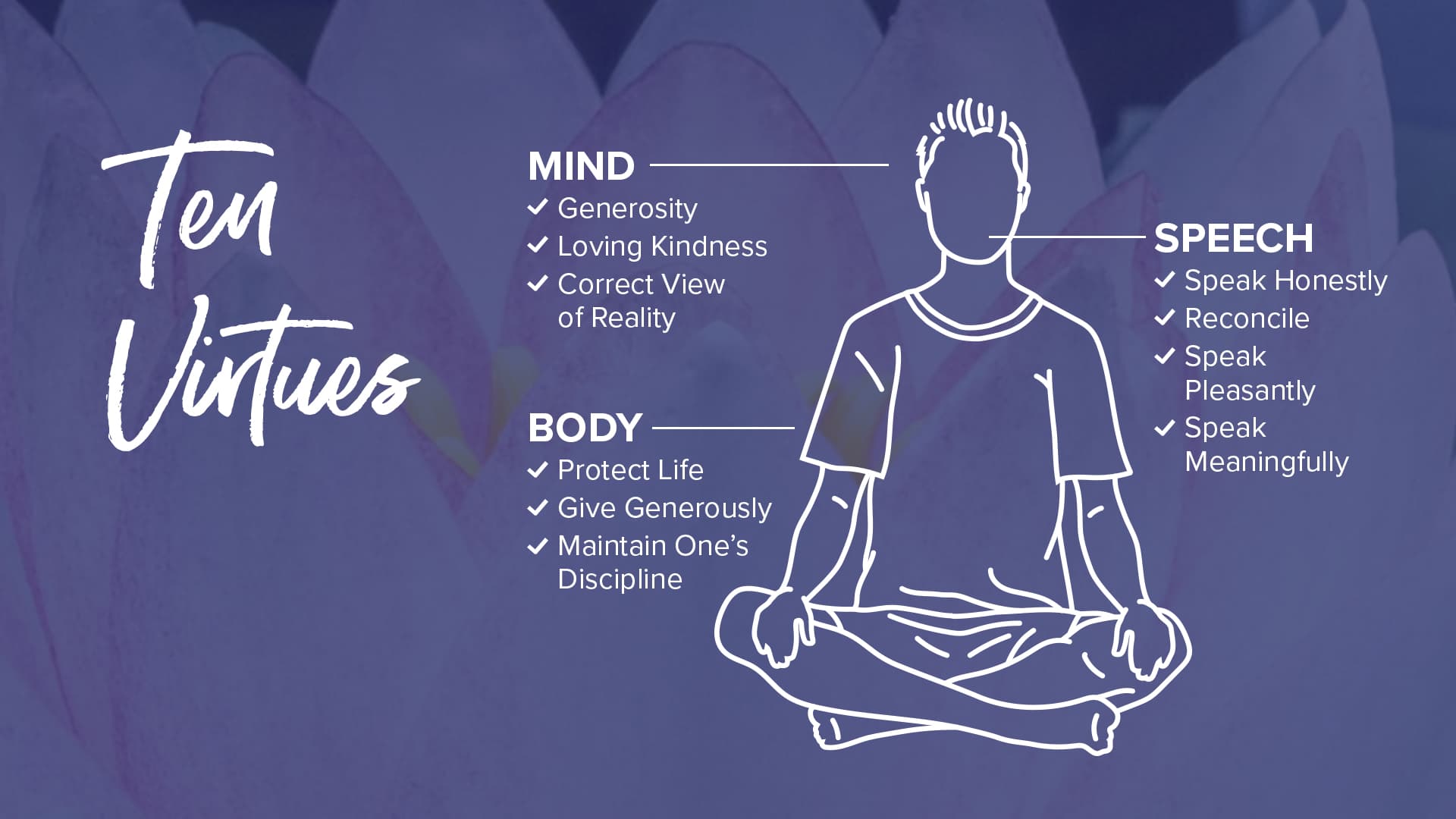Welcome to your crash course in Buddhist Ethics! Don’t worry, there won’t be any actual crashing. Hopefully this will be more of a road map of where to go depending on your desired destination. If you’re going for happiness and enlightenment, the Buddha advises you to follow the Ten Virtues and avoid the Non-Virtues. If you’re going for suffering and unhappiness, you would do the opposite.
These virtues and non-virtues are also part of contemplating karmic cause and result as discussed in The Four Thoughts of Buddhism. When you understand the process of karma (which literally means “action”), you’ll be more careful about your physical and mental actions. As Sir Isaac Newton said, “For every action there is an equal and opposite reaction.” This principle also applies to actions of body, speech, and even mind, according to Buddhism, Hinduism, and the other great spiritual traditions of the world. The Ten Virtues and Non-Virtues are your guide to how to be more successful in your spiritual evolution as you travel through this life.
For example, doing lots of meditation and then irresponsibly and unkindly breaking up with someone will probably not help us to clear our karmic windshield so that we can see reality more clearly. We just did a little cleaning, then splattered egg batter all over the window.
In Love Your Enemies: How to Break the Anger Habit & Be a Whole Lot Happier Professor Robert Thurman sometimes refers to these as the Ten-Fold Path of Skillful and Unskillful Evolutionary Action. If we want to spiritually develop ourselves, there are certain actions that will hinder that progress and others that will help it.
When we say, “Buddhist Ethics,” these aren’t considered to be right or wrong merely because the Buddha said so. What the Buddha taught is that if you want to be happy, there are certain behaviors that will help you attain that goal and others that will prevent it. In Buddhism, virtue is anything that causes happiness, and non-virtue is anything that causes suffering.
If you want to drive to New York from California and you drive north, you might have trouble getting to your destination. Here are some guidelines to keep you on track:
Ten Non-Virtues of Buddhism:

To understand these Ten Virtues and Non-virtues, we’ll begin by explaining the non-virtues. Avoiding or abandoning such actions forms the basis of the path of Buddhist Ethics. The Ten Non-Virtues are broken down into three groups as they are expressed by our bodies, our speech, or in our minds. These ten are:
| Body | Killing, Stealing, Sexual Misconduct | |||
| Speech | Lying, Divisive Speech, Harsh Speech, Pointless Gossip | |||
| Mind | Greed/Covetousness, Harmful Intent, Wrong View (denial of cause and effect) |
Engaging in any of these 10 actions is counterproductive to our spiritual path. As Namchak Khen Rinpoche often says in his meditation teachings, “We have to make some efforts to avoid harmful actions or else our meditation will not have much of an effect on us. If we sit quietly on our cushions for 10 minutes or an hour every day but when we get up, we continue lying to people, arguing, fighting, and so on, we won’t make any real progress and our minds will continue to be filled with disturbing thoughts that rob us of the peace that we are seeking.”
That’s why Khen Rinpoche recommends that people work on their meditation, but also recognize that these kinds of destructive behaviors and thought patterns will take us in the opposite direction from our goals. So make commitments to avoid them. This kind of self-discipline and personal development off the cushion, and the behaviors that we strive for in our meditation go hand in hand. This combination of an ethical approach to our conduct and practical methods of taming our minds is built into the traditional Buddhist ethics because they reinforce each other.
As we engage in the path of meditation, we work equally on refining our behavior and making commitments towards that end. Before, we stumbled through life without skill or much concern for the full repercussions of our actions, creating a vicious cycle downward. Now we can take hold of our lives and our minds and create a virtuous cycle upwards! Read here for more methods of multiplying happiness.
The Ten Virtues of Buddhism:

The Ten Virtues are not merely the abandonment of the Ten Non-Virtues but are the engaging in their opposites. For example, instead of merely avoiding killing, we protect life. Instead of merely avoiding mindless gossip, we say things that are intentional, helpful, and meaningful—or we be quiet! These 10 are:
| Body | Protect Life, Give Generously, Maintain One’s Discipline | |||
| Speech | Speak Honestly, Reconcile, Speak Pleasantly, Speak Meaningfully | |||
| Mind | Generosity, Loving Kindness, Correct View of Reality |
There is much more that could be said about the Ten Virtues in terms of one’s motivation for doing such deeds. Simply doing any of these virtuous or non-virtuous behaviors does not necessarily make the behavior virtuous or non-virtuous. The virtue or lack thereof is determined by your intention.
Khen Rinpoche often says, “Virtue and Non-Virtue are determined by the motivation with which an action is done and not by the outer form that the action takes.” This means that virtue and non-virtue are determined by intention rather than result. If you lie to someone in order to protect them from harm, that action is virtuous because it is motivated by a wish to protect life. Conversely, you could say something truthful with the motivation to hurt someone’s feelings. In that case, your action of telling the truth would be non-virtuous because of your motivation.
In general, it is good to avoid any of the Ten Non-Virtues, but there are times when it is necessary to engage in them for the greater good. The exception to this is the three Non-Virtues of Mind [greed/covetousness, harmful intent, wrong view (denial of cause and effect)] that are always harmful and should be avoided. The same goes for the Ten Virtues that we generally should put in practice. When putting the Ten Virtues to practice, we should be clear about our motivation and avoid so-called “virtuous actions” if our motivation is negative.
Keep in mind that engaging in the Ten Virtues and avoiding the Non-Virtues is not a guarantee that we will never experience suffering or difficulty. Life is uncertain, and we will encounter difficulty on any path we choose. But we can learn to experience happiness and stay on the path while experiencing difficulty. We can make choices along the way that will help us create a better world and better karmic results for ourselves.
Perhaps you can choose one of the areas of the Ten Virtues to focus on in upcoming weeks. Ask yourself, your meditation buddy, or your Learning Circle:
- Body: How can I or we do more to protect life? Or give more generously? Or maintain discipline?
- Speech: How can I or we speak more honestly or more pleasantly? Are there any rifts in my relationships that I can reconcile with my words? Is my speech meaningful and contributing positively?
- Mind: Are my thoughts about others generous or self-centered? Can I extend more Loving Kindness to others? How is my perception of reality impacting my view of this situation or person?
For more resources:
Prof. Robert Thurman’s Google Talk on Buddhist Ethics
https://www.youtube.com/watch?v=rlcHaZrpHWY
His Holiness the Dalai Lama
Ethics for The New Millennium

